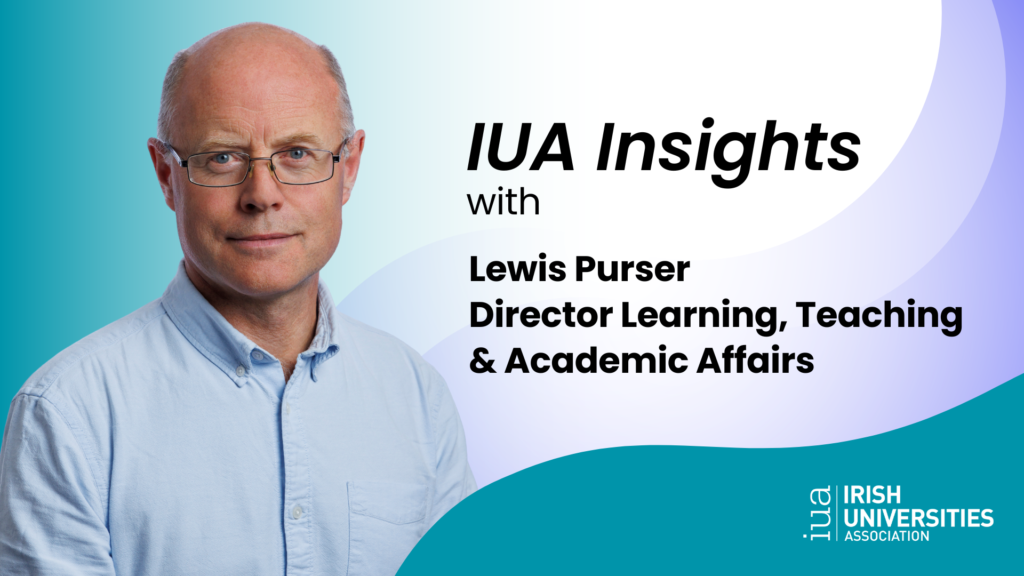
Our new ‘IUA Insights series’ showcases our key services and projects – straight from the experts!
In this edition, we hear from Lewis Purser on understanding Quality Assurance and its importance to our universities.
Understanding Quality Assurance and its importance to our universities
Quality Assurance in universities is all about making sure that students get the most out of their education. It’s not just about meeting standards; it’s about creating an environment where learning is truly meaningful, and the experience is as enriching as possible. When universities focus on quality assurance, they’re ensuring that courses are well-designed, teaching methods are effective, and support services are in place to help students thrive. This leads to more student engagement in the classroom and other learning activities, better student success rates and ultimately better graduate outcomes.
Why Quality Assurance Matters in Higher Education
Quality Assurance (QA) processes promote accountability, openness and transparency. They are important in ensuring that, at the end of a programme of study or training, the qualification awarded to a learner is credible and trustworthy. They facilitate student and graduate mobility and employability, and they underpin the recognition of study credits and degrees obtained in other universities.
The Role of the Irish National Framework of Qualifications
All Irish university qualifications are underpinned by core principles of quality, recognition, access, transfer and progression, as per the Irish National Framework of Qualifications, and are recognised internationally for the purposes of further study and employment.

Governance and Responsibility for Quality Assurance in Irish Universities
As Designated Awarding Bodies under legislation, Irish universities are responsible for the approval and ongoing quality assurance of their own study programmes and of the degrees they award. These arrangements fall under the overall governance of the universities’ academic councils and the Registrars / Vice-Presidents Academic. They are supported by Quality Offices which work across the entire university, to ensure that these QA processes and procedures continue to enhance the quality of learning and teaching, and of all the functions which support this, year on year.
Internal Quality Assurance Procedures at Irish Universities
The internal QA procedures in Irish universities include evaluations of study programmes and learning and teaching activities, and reviews of schools, faculties and colleges, as well as of administrative and service units within each university. These periodic reviews are organised by each university and involve both students and external expert reviewers from other universities or from relevant industry partners. The reports arising from these reviews are published on the universities’ websites. Many of these external experts come from other European countries or from further afield. Likewise, Irish academics are often invited to contribute to evaluations and reviews which take place in other countries.
The Role of Quality and Qualifications Ireland (QQI)
Quality and Qualifications Ireland (QQI, the national regulatory agency), has a complementary external quality assurance role. It ensures that universities have appropriate QA procedures in place, and that these are implemented and effective. QQI conducts independent external quality reviews of the universities on a periodic basis. The third cycle of these institutional reviews is currently coming to a close, and planning for the next cycle are expected to begin later in 2025.
External Reviews and Their Impact on University Education
These external reviews provide the opportunity to evaluate the effectiveness and implementation of institution-wide quality assurance procedures, for the purposes of establishing, ascertaining, maintaining and enhancing the quality of education, training, research and related services each university provides. The reports arising from these reviews are published on the QQI website.
In addition to conducting regular ongoing reviews and evaluations, all of the universities have annual Dialogue Meetings with QQI and provide the agency with an Annual Institutional Quality Assurance Report for each academic year. QQI also publishes regular relevant reports, such as its latest Quality in Irish Higher Education report (October 2024). Regular evaluations lead to better curricula, more effective teaching strategies, and enhanced learning experiences for students.
European Policy Framework for Quality Assurance
Irish universities and QQI all operate within a broader European policy framework for quality assurance, codified in the Standards and Guidelines for Quality Assurance in the European Higher Education Area (ESG). These Standards and Guidelines are currently being revised through an extensive process involving the main European stakeholders. The Irish universities have contributed to the first phase of this process, through IUA’s role in the recent Quality Assurance Fit for the Future (QA-FIT) project, which looked at the design and implementation of internal and external quality assurance in the EHEA and the impact of the ESG to date. IUA was invited to participate in the project as one of the national partners, to strengthen the university perspective. It demonstrates the strong reputation of QA in Irish HE and the active engagement of the universities that IUA was one of the organisations chosen to support the project and its outcomes.
Quality Assurance is not just about maintaining standards; it’s about fostering continuous improvement. By regularly evaluating programs and policies, universities can adapt to changing trends in education, technology, and the labour market, ensuring that they remain relevant and effective in the long term.
- Lewis Purser is the Director of Learning & Teaching and Academic Affairs at the Irish Universities Association.